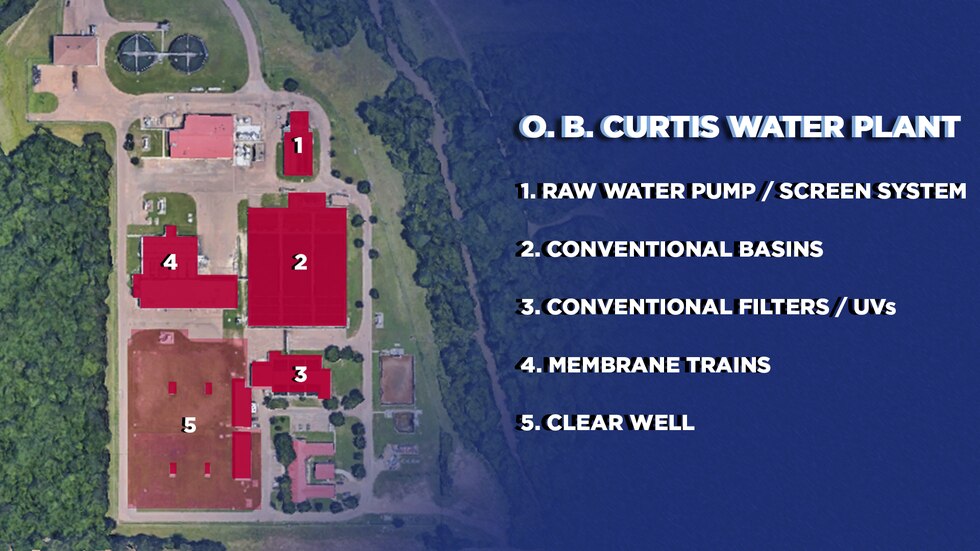Jackson Water Crisis Continues Despite Federal Government Interventions
Congress has pledged $600 million while the majority African American city remains in a state of emergency

All Global Research articles can be read in 51 languages by activating the Translate Website button below the author’s name.
To receive Global Research’s Daily Newsletter (selected articles), click here.
Follow us on Instagram and Twitter and subscribe to our Telegram Channel. Feel free to repost and share widely Global Research articles.
***
In a city of more than 150,000 people which is the capital of the State of Mississippi, residents of Jackson were facing an all too familiar water crisis over the holiday period of late 2022 and early 2023.
Extreme weather events impacted huge swaths of territory within the United States during late December and the first week of January resulting in the injury and deaths of many persons.
In Jackson, below freezing temperatures precipitated pipe breaks disrupting the flow of water throughout the city. Some people had very low water flow while others had no pressure at all making it impossible to function under any semblance of normalcy.
On the south side of the city the situation appears to be more acute than any other areas. People reported that for seven days there was no water service in this area of the municipality.
At the Historically Black College (HBCU) Jackson State University (JSU), the administration sent out an e-mail requesting that students not return to campus until the second week of the month due to the lack of water pressure in the buildings and dormitories. This is the second consecutive semester where students have been urged not to return to the campus due to failure of the O.B. Curtis water treatment plant along with persistent structural damage to the system.
Jackson water treatment plant
According to the JSU public notice to the community:
“As an update, the City of Jackson continues to make repairs to broken water pipes near campus. While we anticipate these repairs should be completed before classes begin on January 9th, our water pressure on campus remains low at this time. For your convenience, students who can are encouraged to arrive in the latter part of the week or weekend.”
The water crisis does not only impact higher education. The Jackson Public Schools (JPS) has again reverted back to virtual learning as of January 5-6. The JPS announced that students and parents could retrieve learning materials on January 4. Lunches for students will also be available for pick up at the schools for January 5-6. There are 33 schools operating under the control of the JPS where they are facing low or no water pressure in the buildings.
The school system noted in a statement:
“The loss of water pressure in our school communities has had an enormous impact on us all. Please know that this decision was made after careful consideration of many factors, including the possibility of more schools losing pressure while scholars and staff are present, and the challenge of maintaining a safe and clean environment.”
City Councilman Aaron Banks of Ward 6 called for a town hall meeting on January 2 in an effort to seek information on the current status of the water system. The councilman in a press statement reprinted over social media suggested that the city administration was not forthcoming in reporting on the extent of the crisis. Although statements are being periodically issued by the offices of Mayor Chokwe Antar Lumumba saying that progress is being made in repairing the water system, Banks apparently is not satisfied with the current situation.
Banks said in a press statement on New Year’s Day that:
“People are seeking information and as a councilman, I would like to provide daily updates to ALL those that are suffering, but, especially those that I represent. As the councilman for the area of Jackson that is usually hit the hardest during most water crises, I think the flow of communication/information should be stronger, more consistent, more frequent and presented in a more truthful and concise way. People are seeking information and as a councilman, I would like to provide daily updates to ALL those that are suffering, but, especially those that I represent. As the councilman for the area of Jackson that is usually hit the hardest during most water crises, I think the flow of communication/information should be stronger, more consistent, more frequently and presented in a more truthful and concise way.”
As of January 3, the Clarion Ledger newspaper reported that most of the city of Jackson remained under a boil-water alert. The media outlet then announced several locations in South and West Jackson where bottled water could be picked up by residents. Elderly people and those living with disabilities were encouraged to call a number to ostensibly arrange for water to be delivered to their homes.
The Role of the State and Federal Governments in the Crisis
Although the burden of the water crisis has fallen on local authorities and residents of Jackson, the city and state of Mississippi has a long history of institutional racism and national oppression extending back to the antebellum period. Moreover, the complicity of the successive United States administrations and the Congress cannot go unrecognized.
During the recent period, the U.S. Justice Department has filed suit against the City of Jackson on behalf of the Environmental Protection Agency (EPA) under the guise of violations of the Clean Water Act. In addition to the lawsuit, the city is being forced to accept a consent decree imposed by the federal government which involved the appointment of a “third-party administrator”, Ted Henifin, for the O.B. Curtis water treatment plant.
At the town hall meeting hosted by Councilman Banks, Henifin was present and expressed sympathy for the people of Jackson and those under its water system. Henifin said he had come out of retirement in Virginia to take his current position. Hundreds of people attended the meeting to express their frustrations with the perennial water crisis in Jackson.
Nonetheless, the situation in Jackson warrants far more urgent measures than what has been proposed and enacted by the federal government under the administration of President Joe Biden. Although the former majority-Democratic Congress along with the Senate approved a $600 million dollar appropriation through the Omnibus Bill to address the water crisis in Jackson, it remains to be seen whether this pledge will be sufficient to effectively fix the problems. Mayor Lumumba says that at least $2 billion is needed to repair the system. (See this)
The fact that Jackson is an 83% majority African American city further emphasizes the historical plight of these oppressed people in the U.S. Mississippi continues to be one of the most impoverished states in the U.S. Consequently, it is by no means coincidental that the contradictions prevalent in modern-day 21st century urban society are glaringly obvious in this southern state.
Even some six-to-seven decades after the Civil Rights Movement of the 1950s and 1960s in Mississippi where scores of people were martyred, imprisoned and dislocated, the promise of the Great Society and War on Poverty programs as well as the Voting Rights Act of 1965 remains unfulfilled. Obviously, the Republican-dominated Mississippi state government is biased towards the Black-dominated city of Jackson. Such an attitude is reflected in comments from state officials solely blaming the people in Jackson for the water crisis. However, Jackson is the capital of the State of Mississippi and therefore, the government there must bear responsibility along with the federal government for the present situation.
Structural problems in the water system should have never gotten to this level. Where has the State of Mississippi and the EPA been all of these decades when the O.B. Curtis water treatment plant and the pipelines have been deteriorating?
The Clarion Ledger in an article on the City Council town hall meeting on January 2, emphasized:
“He (Henifin) characterized Jackson’s water problems as ‘extremely complicated’ and portrayed the nationally publicized water problems facing Flint, Michigan, as ‘simple’ compared to the challenges in Jackson. Among the problems noted by Henifin was a non-functioning water quality monitoring system at intake valves feeding the O. B. Curtis plant. The system is supposed to measure things like the ph level and turbidity of incoming water from the reservoir but because it doesn’t work the water cannot be tested and chemically treated until it reaches the plant, he said. An old and porous distribution system which wastes as much or more treated water than it actually delivers to customers is another huge concern. By some estimates Jackson loses upwards of 30 million gallons a day, requiring the city to treat at least twice the amount of water that other cities of similar size do, he said.”
Consequently, it could take several years to correct the existing structural issues hampering the normal functioning of the water system in Jackson. With the dysfunctionality of the Republican-dominated Congress which could not during the first week of 2023 agree on a Speaker, it remains unlikely that the House of Representatives could engage in another legislative act which could provide much-needed immediate relief to the people of Jackson.
Moreover, the crisis in Jackson is not taking place within a social vacuum. Cities, suburbs and rural areas across the U.S. are in need of similar interventions by the state and federal governments. Water systems, schools, housing, power grids and healthcare institutions are in dire need of massive government subsidization.
Such priorities conflict with the existing war policies which provide over $1 trillion per year for defense, nuclear weapons and intelligence. The majority of House and Senate members irrespective of political party are firmly aligned with international finance capital and the Pentagon. Until the people take control of the political direction of the U.S., there will continue to be the rapid deterioration of the standards of living among the workers and oppressed.
*
Note to readers: Please click the share buttons above or below. Follow us on Instagram and Twitter and subscribe to our Telegram Channel. Feel free to repost and share widely Global Research articles.
Abayomi Azikiwe is the editor of the Pan-African News Wire. He is a regular contributor to Global Research.
Featured image: Jackson Mayor Chokwe Antar Lumumba at press conference / All images in this article are from the author


